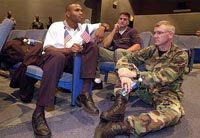There’s a one-liner I often repeat: “Everyone yearns to go to heaven, but no one wants to be the first in line to go there.”
 Military life is much the same way — most are willing to serve, but few want to be first in line — especially a deployment line.
Military life is much the same way — most are willing to serve, but few want to be first in line — especially a deployment line.
But this past weekend, 25 National Guardsmen in my unit were
called to the Mobilization Processing Line.
The deployment line is a one-stop shop consisting of rows of desks outlining a large room. Each desk is manned by someone who will negotiate and approve the last details of immunizations, wills, dog tags, medical or dental issues, and personal problems.
Initially, the talk is light as guardsmen begin checking dog tags and trade punches on their freshly immunized arms. The line is full of good-natured complaints about the upcoming flights, haircuts or the size of their duffel bags.
But the further down the line, the tasks become more serious.
At a table labeled “dependent care,” a husband and wife seek approval of their childcare plan that leaves their three children with friends.
At the legal table, someone’s son signs a will leaving possessions to his mother. A power of attorney is also submitted so dad will be able to make the necessary health-care decisions.
Adjacent to that table, a daughter verifies her address so Casualty Notification Teams can properly notify her only sister if she is wounded, dead or missing.
At the last table, I sit with the family support director and the squadron recruiter. The recruiter hands out pride items bearing squadron emblems — pencils, key rings and calendars with a lot of fast jets. Moods lighten momentarily as soldiers grab for the” cool stuff” and slap silly stickers on the back of an unsuspecting comrade.
The family support table is full of coloring books depicting” Major Mom” walking a jetway lined with flag-waving well-wishers. The support director demonstrates the new videophones for two moms eager to call their children. In turn, the moms show the director pictures of newborns as another soldier interjects
a plea for someone to check on his pregnant wife.
As they come to me, I hand them a camouflage Bible and joke about listing the soldiers’ sins on their deployment approval sheet. But all jokes aside, I’m the last guy who might be able to detour the troops from their mandatory destination.
It is here that eyes moisten and faces harden as they hear me ask, “Sergeant, is there anything that would prevent you from going on this deployment?”
I ask this question because not everyone snaps a proverbial salute at the receipt of their orders. It is possible that some are feeling a conscientious objection to this action. Others may feel depressed or like they are in someway a danger to themselves or others.
Still, there may be some in line who had hoped to retire or just get out, but the military says they perform such an essential job, they can’t leave unless by death they do part. The military calls this predicament a stop/loss order, and it brings the same excitement a draft notice brings an 18-year-old.
All reasons aside, 99 percent are ready to go. They ready themselves, talking about fate or predestination or some larger force outside themselves that moves them to this point.
But, despite this philosophizing, there is still tons of stuff beneath their camouflaged exterior. They are leaving families, homes and jobs. Their psyche is a mixing bowl for fear, pride and bravado.
This coming week, Christians will honor that hour that Jesus, too, found himself struggling with something he must do. The struggle took place in the garden of Gethsemane where, hoping God might spare him from the crucifixion, Jesus prayed, “If it be your will, may this cup pass from me.”
For these troops, this was their “Gethsemane moment.” They come here to taste the cup they must drink and do the job our leaders have decided needs to be done, whether they agree or not.
And, for most of them, it will be this willingness to drink the “cup” that will harden their resolve to win this fight and come home to those they love.




